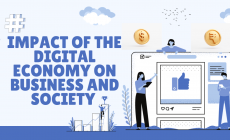-
UNION INTERIM BUDGET 2024-25 -
-
Are cryptocurrencies the future of the digital world economy -
-
Breaking Waves, Breaking News: Lakshadweep’s Recent Developments Explored -
-
The Impact of the Digital Economy on Business and Society -
-
Augmented Marketing: A Comprehensive Guide -
-
How To Strengthen Your Email Marketing Using AI -
-
How Artificial Intelligence and Digitization Are Transforming Our Lives -
-
What Data Science Tools do the Experts Recommend? -
-
Robotic Process Automation Will Transform Your Business? Check Here! -
-
Edge Computing: How it is Reshaping Cloud Infrastructure -
Apple Takes a Big Lead as its Market Cap Hits $1 Trillion Mark
California: The tech giant, Apple, reached the historic milestone as it becomes the first company of the world to be the first trillion-dollar public company. It left behind Amazon and Google as its shares hit $207.05 mark.
The historic mark of $1 trillion market capitalization 42 years after Apple was founded in 1976. The company was co-founded by the late Steve Jobs to sell personal computers. Since Tim Cook has replaced Jobs as Chief Executive in 2011, the share price of Apple has grown fourfold.
Notably, 117 years ago, US Steel became the first company to be valued at $1 billion in 1901.
With this historic feat, Apple’s stock market value is more than a third the size of the UK economy and larger than the economies of Turkey and Switzerland.
Interestingly, the national oil company of Saudi Arabia, Saudi Aramco, could be worth up to $2 trillion upon its planned stock market float but the value is still to be tested.
Strong Financial Results
The surge in the share price of Apple was on the backdrop of quarterly financial results which were released on Tuesday and better than what Wall Street had expected.
In the last three months, the profits of the company were recorded to be $11.5 billion on the backdrop of record sales that hit $53.3 billion. This skyrocketed the share prices of the iPhone giant and the valuation of the company triggered from $935 billion to $1 trillion (£770bn). Luca Maestri, Finance Chief of Apple stated that growth was strong all across the globe.
The company is sitting on a $285bn mountain of cash reserves and made a net profit of $48.5bn in 2017, its last set of full-year results.
Astounding Performance Leaves the Rivals Behind
Apple’s astounding recent performance has left rivals in the competitive technology sector trailing in its wake.
Its strong financial figures were in marked contrast to those of Facebook, which suffered the worst day for a single company in US stock market history last week, losing more than $120bn from its value as its shares fell more than 20 per cent.
Amazon, which was regarded as the next most likely to breach the $1tn mark, was also left behind despite posting higher-than-expected profits last week.
A fall in the retailer’s share price since then means it is now worth $883bn, while fellow tech giant Alphabet – Google’s parent company – is valued at $845bn.
Ups and Downs in the Journey
Apple was co-founded in 1976 by Jobs, Ronald Wayne and Steve Wozniak, who is credited with designing and building the company’s first desktop computer, the Apple I, which sold for $666.66.
Despite being among the key pioneers of the personal computer revolution, Jobs resigned from the company in 1985 after falling out with the then chief executive John Sculley.
He did not return until 1997, when Apple paid $427m to acquire workstation computer company NeXT, becoming chief executive shortly afterwards.
The company had been flirting with bankruptcy and was thought to have lost its way as it lost market share to Bill Gates’ Microsoft.
But Jobs revived its fortunes, working closely with British designer Jony Ive to develop products such as the iMac that married sleek aesthetics with pioneering technology.
But it was the decision to branch out from computers that turbocharged the company’s fortunes at the turn of the 21st century, as Apple moved into the arena of personal gadgets.
The result was the invention of disruptive products such as the iPod in 2001 and the iPhone in 2007, which became cultural landmarks as well as pushing technological boundaries.
Since the launch of the iPhone, there have been 18 different iterations and more than 1.2bn have been sold. The gadget accounts for 60 per cent of the company’s $229bn in annual sales.
Apple’s success turned Jobs into one of the most respected inventors and business figures in the world.
But in 2011, a year and a half after returning to work following a liver transplant, he was forced to step down as chief executive as his health failed. He handed control of the company to Tim Cook and died just weeks later aged 56.
Under Cook, the company extended its reputation for taking big bets on risky products, such as the Apple Watch, and the cordless AirPod headphones, which dispensed with the need for a headphone jack on its phones.
But it has also faced controversy, including criticism of its attitude towards payment of corporation tax and the labour conditions faced by the factory workers who make the products it sells to wealthy consumers.
In 2017, the European Commission to Ireland, finding that its use of arcane corporate structures to limit its tax payments was illegal.
Among the revelations that emerged from the Paradise Papers last year, the Guardian revealed that Apple had secretly shifted key parts of its empire to Jersey as part of a complex rearrangement that allowed it to keep an ultra-low tax rate.
In 2011, it was accused of exploiting Chinese workers, amid a string of suicides at the factory of its supplier Foxconn in southern China, where staff were alleged to be working excessive hours in poor conditions.































